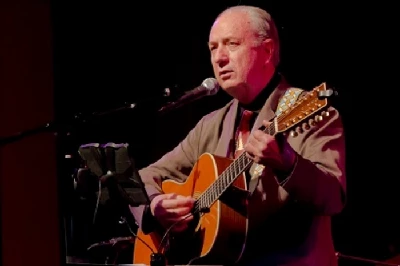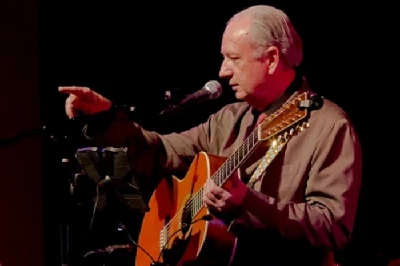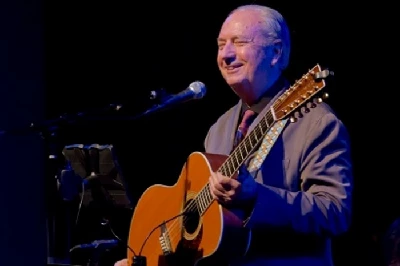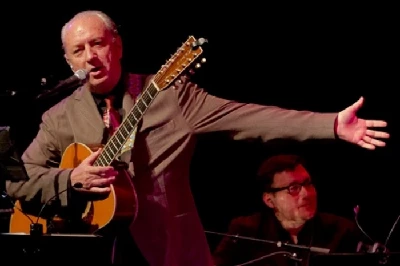Michael Nesmith
-
Old Town School of Folk Music, Chicago, 6/4/2013
published: 28 /
4 /
2013

Lisa Torem watches former Monkee Michael Nesmith play a heartfelt set at the Old Town School of Folk Music in Chicago in his first solo U.S. tour in more than two decades
Article
Even though this was his first solo U.S. tour in more than two decades, former Monkee Michael Nesmith must have felt right at home. Shortly after his quartet set up, he inhaled the intimacy of Old Town School’s cozy sanctum. “It’s like somebody’s living room,” he stated, as random screams and flashing peace signs celebrated his presence.
As if to foreshadow further requests, Nez made it clear he’d open with the sole song he’d perform tonight, which was made famous by the Monkees, ‘Papa Gene’s Blues.’ It was the perfect, high-octane starter. The silver-haired songwriter’s non-diva personality quickly soared to the surface - he introduced his talented touring band immediately - a courtesy many headliners leave until performing the penultimate song.
Dressed in a colourful tie, jacket and denim, he added that he would be “playing songs I wrote over the last 50 years.” “It’s a little community,” he said, setting the stage for ‘Propinquity.’ Soft and mellow strums left adequate space for his tear-stained vocals. “I’ve seen you make a look of love from just an icy stare,” he sang, fixing his long fingers on his swaying acoustic.
Between songs, Nez chronicled an edgy relationship between a fictional man and a woman, “he” and “she,” in image-rich rhetoric. Because these stanzas were devoid of dramatic intonation, the listeners could piece together their own version of this “cinematic” saga. One young, dedicated fan later hinted that these stories paralleled Nez’s personal trials, although if they did, specifically, he didn’t let us in on the secret.
‘Tomorrow and Me’ was dreamy and nostalgic. The sequences intensified as Nez walked us through 1930s Paris and whispered. “The moonlight reflects on the tiny headlight of the water.” His next sotto voce reference of “She wants to be a mother/He wants to be a lover” was proclaimed before launching into ‘Different Drum,’ recorded by Linda Ronstadt and the Stone Ponies. The baby boomers that still remember that singer’s timeless rendition might have been surprised at this old-world waltz driven by mandolin.
‘Joanne’ and ‘Silver Moon’ were introduced as a set, with the latter assuming a carefree Jimmy Buffet feel and the former featuring Nez’s careening falsetto. Doubling on guitar and pedal steel throughout the night, Chris Scruggs brought out the beauty of the melodies with his Duane Eddy growls and evocative Red Rhodes vantage point.
The plaintive ‘Some of Shelly’s Blues’ contrasted the giddy ‘Rio’ ('From a Radio Engine to the Photon Wing', 1977) and ‘Casablanca Moonlight’, where Scruggs garnered more admiring glances from the sold out crowd. During the narrative, Nez contemplated the 1960s and “a screaming bright red Ferrari” before embarking on ‘The Grand Ennui’, which triggered a sudden shift into screaming rock and, more specifically, brilliant keyboard solo work by Bob Cooper.
‘Cruisin’ embraced several of Nez’s most entertaining video characters: “Lucy and Ramona and brother Sunset Sam” within its contagious refrain. Nez is also known for his impressive video production work: In the 1980s he produced Lionel Richie’s ‘All Night Long’ and Michael Jackson’s ‘The Way You Make Me Feel.’
Then it was on to the title song of his most recent collection, 'Rays', produced in 2006 and then three songs from his 1974 seven-song collection 'The Prison'. When Nez first wrote the original story, it was meant to be read alongside this music. It was here that his natural instinct for lyrical poetry burst forth. On ‘Life, the Unsuspecting Captive', his deep voice levitated over the venue. And by the time he uttered, “I’m watching another exceptional flower beginning to blossom and grow,” his rep. as a sensitive writer had been validated. The finale, ‘Laugh Kills Lonesome’ from 'Tropical Campfires', (1972) was more of a samba, devil-may-care hybrid – and a tremendous vehicle for the backing band’s stomping ensemble solos. It was high time that drummer, Paul Leim, got a chance to shine alongside riveting bassist, Joe Chemay.
“Thank you for supporting me all these years,” stammered Nez, clearly moved by the enthusiastic response he received. His encore included a shimmering sample of his dear, late friend and fellow musician, Red Rhodes, playing Hawaiian pedal steel. They had first played together when Nez formed the First National Band, after which time their relationship blossomed, professionally and personally.
“I’ll just mosey on. Thanks for the ride,” Nez muttered in his indelible Texas drawl, alluding to the final song, before saying goodnight. Although he had admitted feeling some fear initially about facing an audience once again, he didn’t really have to. His absence only made the heart grow that much fonder.
The photographs that accompany this article were taken by Philamonjaro at www.philamonjaro.com.
Picture Gallery:-


